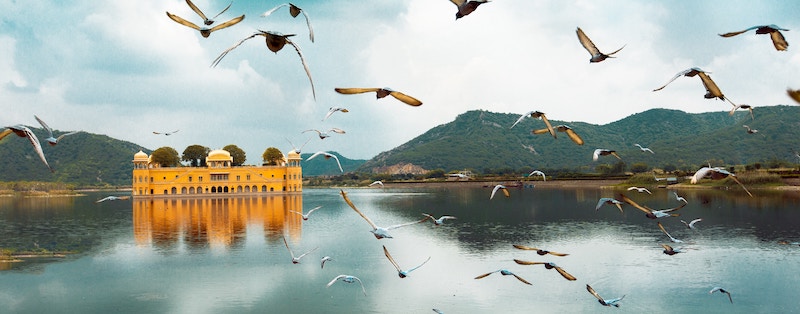From water-borne diseases to bug bites to eating street food and getting a case of traveler’s diarrhea, there are many ways you can inadvertently become sick while traveling in India. Here are some things to keep an eye out for to stay healthy during your India visit.
For the most part, India is a safe destination for international travelers. But there are some things to be aware of for your health and safety.
- Staying Healthy in India
- Common Diseases Found in India
- Required India Vaccinations for US Travelers
- Medical Treatment in India
- Bringing Medications Into India
- Travel Insurance for India
- Water and Swimming in India
- Eating Food in India
- Mosquitoes
- Air Quality in India
- Crime in India
- Civil Unrest
- Terrorism
- Climate and Natural Disasters
- Local Laws in India
- Embassies and Consulates in India
- Stay Safe and Have Fun in India
Staying Healthy in India
Common Diseases Found in India
- Cholera
- Hepatitis A and B
- Malaria
- Dengue fever
- Chikungunya
- Rabies
- Yellow fever
- Measles
- Typhoid
Required India Vaccinations for US Travelers
In addition to being up-to-date on your regular vaccinations, like flu, polio, shingles, and measles, the following are either required or recommended vaccinations you should get before traveling to India, particularly if you have pre-existing medical conditions.
- COVID-19: Recommended
- Cholera: Recommended
- Hepatitis A: Recommended for unvaccinated travelers one-year-old or older and infants ages six to 11 months
- Hepatitis B: Recommended for unvaccinated travelers ages 60 or older
- Yellow fever: Required if coming from known yellow fever–infected country or region
- Japanese encephalitis: Recommended if coming from infected area
- Malaria: Highly recommended
You should get any recommended or required vaccinations at least a month before your trip.
Medical Treatment in India
You’ll find plenty of healthcare options in major cities and urban areas, but both the availability and quality of care in rural areas may be lacking.
- Private hospitals, like Apollo Hospital, Max Healthcare, and Fortis Healthcare offer high-quality medical care, Western-trained doctors, and English-speaking staff. These higher-end hospitals are typically more expensive.
- Government hospitals, like the India Institute of Medical Sciences, KEM Hospital in Mumbai, and Safdarjung Hospital in Delhi, offer medical care at a lower cost and with varying levels of quality. English-speaking staff may not always be available.
- For minor injuries or illnesses, you can visit private clinic chains, like Apollo Clinic, Fortis Clinic, and Max Clinics.
- Some hotels also have doctors on call to provide medical assistance to guests.
If you’re having a medical emergency, call 112. This is the Indian Emergency Number and connects you to emergency resources, like ambulances, police, and fire trucks.
Bringing Medications Into India
If you need to bring prescribed medication with you during your trip, follow these steps first:
- Check with the Indian government—the Central Drugs Standard Control Organization (CDSCO) of India or an Indian embassy or consulate—to ensure that the drug is legal to bring into the country.
- Carry the medications in their original packing.
- Bring a copy of the prescription or a letter from your doctor.
- Declare your medications when going through customs.
- Don’t bring excess amounts.
Travel Insurance for India
While medical care in India is affordable, it doesn’t hurt to have extra coverage just in case. Getting comprehensive travel insurance for your trip is highly recommended—not only can it protect you from unexpected medical expenses, but it can also offer coverage for unexpected issues, like delays or cancellations.
Should you have an accident or fall ill while traveling, most travel-insurance companies offer a 24/7 hotline to assist you. They can help navigate your care locally while in India. Battleface, Allianz, World Nomads, and HTH Worldwide are all reputed, trusted brands, offering customizable travel insurance plans to fit your needs.
Water and Swimming in India
As a general rule, you don’t want to use or drink tap water in India—throughout the country, it’s often contaminated with bacteria, pathogens, or viruses. Drinking contaminated tap water can lead to upset stomachs and diarrhea. Stick to drinking and using bottled water or water that has been thoroughly boiled and filtered.
Because of the contaminated water, you should also be picky about where you go swimming. If you’re traveling in coastal regions like Goa, the water is generally safe for swimming, but bacteria-ridden rivers like the Ganges are not recommended.
The Ganges is a holy river for Hindus, so you may see people swimming and bathing in it. But the water can be extremely polluted by waste, sewage, and other contaminants, especially where it leaves the holy city of Varanasi. Enjoy the view and don’t take the dip.
Eating Food in India
From curries to dosas to lassi to some of the best vegetarian food you’ll find, trying out India’s delicious and diverse cuisine is one of the top reasons to visit. But as tasty as it is, Indian food can still upset foreign bellies. Here are some things to be aware of before ordering:
- Don’t eat things that can’t be peeled, as they were likely washed in contaminated water.
- It’s ok to eat with your hands here, and as long as you clean and sanitize, it may be cleaner than using plates and utensils that have been washed in contaminated tap water.
- Don’t drink fruit juice from street stalls, as it’s often watered down with tap water.
- You don’t necessarily need to avoid street food, but use caution when choosing which stalls to eat from as they may not be the most sanitary.
Mosquitoes
Not just a problem in rural and forested areas, mosquitoes are a widespread issue in India, especially during the monsoon season between April and September.
As mosquitoes can carry illnesses, like malaria, dengue fever, and chikungunya, you’ll want to take steps to protect yourself. Ask a medical professional about malaria drugs before departure, and carry and use mosquito repellent, wear long sleeves and long pants, and sleep under a mosquito net while you’re there.
Air Quality in India
Air pollution is a major problem in India, where many cities suffer from poor, unhealthy air quality. Before going out exploring each day, use AQI to see what the air quality in your area is like for that day. If the quality is bad, try to avoid being outdoors for long periods of time or wear a mask.
Crime in India
Violent crime isn’t a major issue in India, but petty crimes, like pickpocketing, scamming, and mugging, frequently take place in major cities and around tourist attractions.
In big cities, such as Delhi, Kolkata, Mumbai, and Bangalore, be wary of pickpocketing in large crowds and at major tourist sites. You should also be alert to common scams, like being overcharged in unauthorized taxis or having women put Indian flag pins on you and requesting donations.
Exercise common sense and keep yourself safe from petty crime in India by:
- Staying in busy, well-lit areas
- Avoiding badly lit and unfamiliar areas at night
- Not carrying large amounts of cash or valuable personal belongings on you
- Being aware of your surroundings
- Being careful on public transport—don’t get onto empty buses or trains
Crime Against Women
India has a high rate of gender inequality, and street harassment, sexual harassment, rape, and sexual assault are issues here. Women, especially those visiting India solo, should take extra precautionary measures to keep themselves safe.
LGBTQ+ Safety
Even though homosexuality was decriminalized in India in 2018, the country’s conservative cultural norms still mean that LGBTQ+ travelers should exercise caution. Avoid public displays of affection, especially in remote or rural areas.
Civil Unrest
One of India’s greatest attractions and attributes is its diverse population of religions and cultures. But that also means that civil unrest does occasionally flare up between religious, ethnic, or political groups. This can take the form of strikes, riots, or demonstrations.
Stay alert to potential civil unrest during your travels by reading local news: Monitor local media, and if strikes or riots do take place in the area you’re traveling, stay away from the affected locations and stay indoors. It’s also best to avoid demonstrations or protests as Indian authorities could misinterpret your presence as participation, potentially leading to arrest and legal issues.
Terrorism
While India has been subject to terrorist attacks in the past, recent years have seen a drop in incidents and attacks. All the same, it’s a good idea to stay alert in risky areas, like Delhi, Bangalore, northeastern India, and in the territory of Jammu and Kashmir.
Avoid terrorist attacks by:
- Staying informed of local news and events
- Avoiding strikes, protests, demonstrations, and riots
- Staying indoors and safe during attacks
- Contacting emergency services and your country’s embassy if you feel at risk
Climate and Natural Disasters
Depending on where you’re traveling in India, you may encounter natural disasters. Coastal regions like Tamil Nadu, Orissa, and the Lakshadweep Islands are prone to cyclones, with earthquakes, severe drought, and avalanches (in the northern parts of the country) also being concerns.
Flooding is the most common type of natural or climate disaster in India, happening near major rivers and coastal areas. While monsoon season plays a key role in flooding and flash floods, some believe climate change is also contributing to worsening floods.
While traveling around India, monitor local media and weather reports to try and avoid disaster areas. If you do find yourself experiencing a natural disaster, follow instructions from local authorities, and contact your country’s embassy as soon as possible.
Local Laws in India
While traveling in India, it’s important to obey the local laws—including those regarding dress codes, public displays of affection, and photo-restricted areas—to avoid getting fined, arrested, or deported.
Embassies and Consulates in India
In case something happens to you during your time in India, you should reach out to your country’s embassy or consulate for assistance. While they can’t provide legal assistance, they can offer guidance and advice for next steps.
Stay Safe and Have Fun in India
Doing your research before traveling helps you avoid issues and be prepared in case of an emergency. For more information on other aspects of travel to India, including local laws, health and safety, local culture and customs, and the visa types available, visit our India content hub.
Obtaining the proper visa is an essential part of planning your trip. At Entriva, we can easily and efficiently help you with every aspect of getting an India visa. Start your visa application process.




